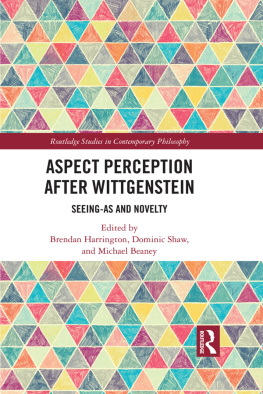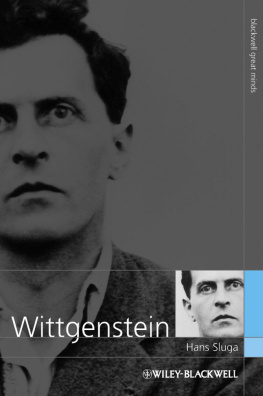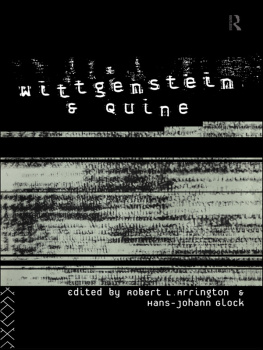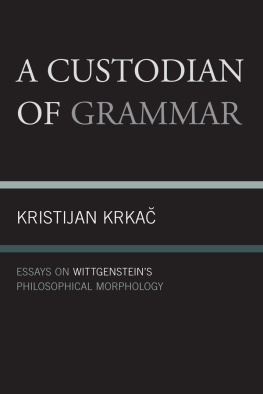The later Wittgenstein is notoriously hard to understand. His novel philosophical approach is the key to understanding his perplexing work. This volume assembles leading Wittgenstein scholars to come to grips with its least well understood aspect: the unfamiliar aims and method that shape Wittgensteins approach.
Contributors: Peter Hacker, Joachim Schulte, Eike von Savigny, Stephen Mulhall, Eugen Fischer, Erich Ammereller, Severin Schroeder, Anthony Kenny, Oswald Hanfling, Cora Diamond, Hans-Johann Glock, Stuart G. Shanker.
WITTGENSTEIN AT WORK
Method in the Philosophical Investigations
Erich Ammereller andEugen Fischer
LONDON AND NEW YORK
TO THE MEMORY OF GORDON PARK BAKER
First published 2004
by Routledge
11 New Fetter Lane, London EC4P 4EE
Simultaneously published in the USA and Canada
by Routledge
29 West 35th Street, New York, NY 10001
Routledge is an imprint of the Taylor & Francis Group
This edition published in the Taylor & Francis e-Library, 2004.
2004 Erich Ammereller and Eugen Fischer
All rights reserved. No part of this book may be reprinted or reproduced or utilized in any form or by any electronic, mechanical, or other means, now known or hereafter invented, including photocopying and recording, or in any information storage or retrieval system, without permission in writing from the publishers.
British Library Cataloguing in Publication Data
A catalogue record for this book is available from the British Library
Library of Congress Cataloging in Publication Data
Wittgenstein at work: method in the Philosophical investigations / edited by Erich Ammereller and Eugen Fischer.
p. cm.
Includes bibliographical references and index.
1. Wittgenstein, Ludwig, 18891951. Philosophische Untersuchungen. 2. Methodology. 3. Philosophy. I. Ammereller, Erich. II. Fischer, Eugen, 1970
B3376.W563 P53278 2004
192dc22 2003023891
ISBN 0-203-56944-X Master e-book ISBN
ISBN 0-203-33833-2 (Adobe eReader Format)
ISBN 0-415-31605-7 (Print Edition)
INTRODUCTION:
AIMS AND METHOD IN THE INVESTIGATIONS
Eugen Fischer and Erich Ammereller
Wittgensteins later philosophical approach is rather unconventional. The remarks that state his conception of philosophical problems and method belong to the most striking sections of the Philosophical Investigations: even a cursory reading of his remarks on the nature of philosophy suffices to make the reader realize that Wittgensteins thoughts on this matter are strikingly at odds with traditional conceptions of what philosophy is about. Remarkably enough, these remarks also belong to the most neglectedand this even though, as various scholars have emphasized, they highlight the most revolutionary aspects of his later work and clearly hold the key to its proper understanding. While a vast amount of literature deals with Wittgensteins contributions to the discussion of various philosophical topics, comparatively little attention was explicitly devoted to the, in some ways, prior question of what kind of contribution he sought to make, and how he wanted to make it. This is the guiding question of the present book: which specific aims does Wittgenstein pursue in the Investigations? What is their rationale? And which methods does he employ to attain them? In brief: what is Wittgenstein trying to achieve in the Investigations? Why? And how? In this introduction, we shall develop these questions, explain this books approach to them, and present the papers that put it to work.
1
Wittgenstein himself provides quite explicit answers to all three parts of our guiding question. But his remarks on this topic have added to rather than reduced perplexity. Thus, for instance, Wittgenstein is notorious for making the claim that in philosophy we may not advance any kind of theory. There must not be anything hypothetical in our considerations. We must do away with all explanation, and description alone must take its place (109). Or consider PI 1268:
Philosophy simply puts everything before us, and neither explains nor deduces anything.Since everything lies open to view, there is nothing to explain. For what is perhaps hidden is of no interest to us
The work of the philosopher consists in assembling reminders for a particular purpose.
If one tried to advance theses in philosophy, it would never be possible to debate them, because everyone would agree to them.
Quite obviously, Wittgensteins view of how philosophy ought to be practised, and is being practised by himself, diverges radically from how philosophers traditionally conceived of their own work. For, whether or not they actually managed to explain anything, philosophers through the ages certainly thought there was something for them to explain, and frequently tried to meet this felt need. In doing so, they were regularly most interested in what is not open to view and hardly ever contented themselves with simply putting everything before us or assembling reminders. Rather, they saw themselves as advancing, if not establishing, theses that gave rise to the liveliest debates.
But if Wittgenstein was not trying to advance any non-trivial claim of the sort philosophers traditionally have been seeking to argue for, if he did not want to explain any fact or formulate any theory, what was his aim, instead? What did he seek to achieve by putting everything before us and assem-bling reminders? At a very abstract level, the aim sounds perfectly familiar: problems are solved (difficulties eliminated) (133). But what Wittgenstein understands by a solution to a philosophical problem seems to be rather less familiar: Philosophical problems, he tells us, should completely disap-pear (133). And this appears to be a predominantly negative or critical aim: so far from consisting in the discovery of new or the explanation of familiar facts, the results of such philosophy are the uncovering of one or the other piece of plain nonsense (119). Apparently by attaining such results, prob-lems are solved (difficulties eliminated) (133).
Wittgensteins rationale for seeking such apparently negative results is provided by the conception of the nature and genesis ofat any rate somephilosophical problems that emerges from the same remarks: thus, e.g. log-ical investigation is said to take its rise not from an interest in the facts of nature, nor from a need to grasp causal connections: but from an urge to understand the basis, or essence, of everything empirical. And it is of the essence of [such] investigation that we do not seek to learn anything










